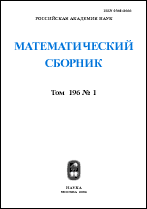|
This article is cited in 19 scientific papers (total in 19 papers)
Homogenization of attractors of non-linear hyperbolic equations with asymptotically degenerate coefficients
L. S. Pankratova, I. D. Chueshovb
a B. Verkin Institute for Low Temperature Physics and Engineering, National Academy of Sciences of Ukraine
b V. N. Karazin Kharkiv National University
Abstract:
A non-linear initial-boundary-value problem for a hyperbolic equation with dissipation is considered in a bounded domain $\Omega$
$$
u^\varepsilon _{tt}+\delta u^\varepsilon _t
-\operatorname {div}\bigl (a^\varepsilon (x)\nabla u^\varepsilon\bigr )
+f(u^\varepsilon)=h^\varepsilon (x),
$$
where $\delta>0$ and the coefficient $a^\varepsilon (x)$ is of order $\varepsilon ^{3+\gamma}$ $(0\leqslant \gamma<1)$ on the union of spherical annuli of thickness $d_\varepsilon=d\varepsilon^{2+\gamma}$. The annuli are periodically, with period $\varepsilon$, distributed in a bounded domain $\Omega$. Outside the union of the annuli $a^\varepsilon (x)\equiv 1$. The asymptotic behaviour of the solutions and the global attractor of the problem are studied as $\varepsilon \to 0$. It is shown that the homogenization of the problem on each finite time interval leads to a system consisting of a non-linear hyperbolic equation and an ordinary second-order differential equation (with respect to $t$). It is also shown that the global attractor of the initial problem approaches in a certain sense a weak global attractor of the homogenized problem.
Received: 05.10.1998
Citation:
L. S. Pankratov, I. D. Chueshov, “Homogenization of attractors of non-linear hyperbolic equations with asymptotically degenerate coefficients”, Sb. Math., 190:9 (1999), 1325–1352
Linking options:
https://www.mathnet.ru/eng/sm427https://doi.org/10.1070/sm1999v190n09ABEH000427 https://www.mathnet.ru/eng/sm/v190/i9/p99
|


| Statistics & downloads: |
| Abstract page: | 544 | | Russian version PDF: | 201 | | English version PDF: | 18 | | References: | 80 | | First page: | 1 |
|




 Contact us:
Contact us: Terms of Use
Terms of Use
 Registration to the website
Registration to the website Logotypes
Logotypes








 Citation in format
Citation in format 
